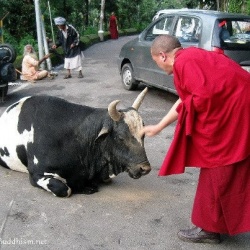Upekkha
Upekkhā (in devanagari: ऊपेक्खा), is the Buddhist concept of equanimity. As one of the Brahma Vihara (meditative states), it is a pure mental state cultivated on the Buddhist path to nirvāna.
Pali literary contexts
Upekkha (Pali: Equanimity) is the quality of being emotionally calm, balanced and even, especially when confronted with difficult situations. Sometimes it is also called equipoise (susamàhita) or being centred (majjhatta). Equanimity is the last of the four Brahma Viharas, one of the different ways love can express itself. It is also mentioned as one of the ten paramitas.
It can be difficult, impossible even, to feel warm friendly regard to someone who has hurt us or who is unapologetically evil. The way we can express love to such a person is by remaining calm, unmoved and free from hatred. From this stance it will be much easier to open up to that person when we have developed our love more strongly. Equanimity is also a skilful way to respond to the many temptations, provocations and sensual impressions that assail us every day. It will allow us to keep our sense of balance and, as the Buddha said, ‘walk evenly over the uneven’ (S.I,4).
Sometimes equanimity is confused with indifference although it is actually easy to distinguish the two. If we remain calm and unmoved because we understand that excitement or agitation is inappropriate, unjustified or unhelpful, this can be called equanimity. If we remain unmoved and uninvolved because we cannot be bothered or because we simply do not care this can be called indifference. Equanimity grows out of knowledge, indifference out of ignorance or selfishness.
In the Pali Canon and post-canonical commentary, upekkha is identified as an important step in one's spiritual development in a number of places:
- It is one of the Four Sublime States (Brahmavihara), which are purifying mental states capable of counteracting the defilements of lust, avarice and ignorance. As a Brahmavihara, it is also one of the forty traditionally identified subjects of Buddhist meditation (Kammatthana).
- In the development of meditative concentration, upekkha arises as the quintessential factor of material absorption, present in the third and fourth Jhana states.
- In the Seven Factors of Enlightenment (bojjhanga), upekkha is the ultimate factor to be developed.
- In the Theravada list of ten paramita (perfections), upekkha is the last-identified Bodhisatta practice.
Similarity with non-Buddhist Concepts
Ataraxia and Apatheia are similar terms in Greek philosophy.
Contemporary exposition
American Buddhist monk Bhikkhu Bodhi wrote:
- “The real meaning of upekkha is equanimity, not indifference in the sense of unconcern for others. As a spiritual virtue, upekkha means stability in the face of the fluctuations of worldly fortune. It is evenness of mind, unshakeable freedom of mind, a state of inner equipoise that cannot be upset by gain and loss, honor and dishonor, praise and blame, pleasure and pain. Upekkha is freedom from all points of self-reference; it is indifference only to the demands of the ego-self with its craving for pleasure and position, not to the well-being of one's fellow human beings. True equanimity is the pinnacle of the four social attitudes that the Buddhist texts call the 'divine abodes': boundless Loving-kindness, compassion, altruistic joy, and equanimity. The last does not override and negate the preceding three, but perfects and consummates them.”
